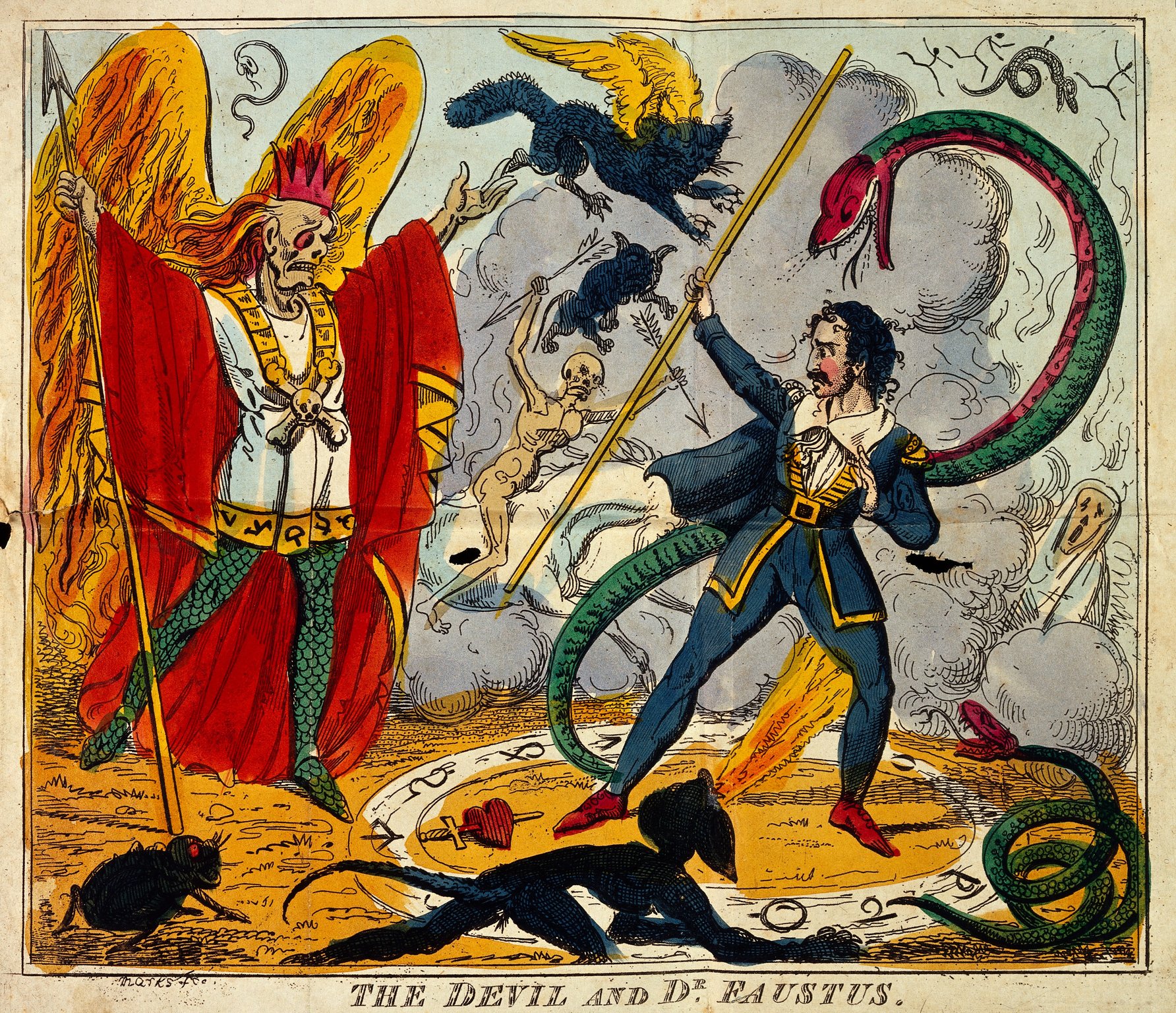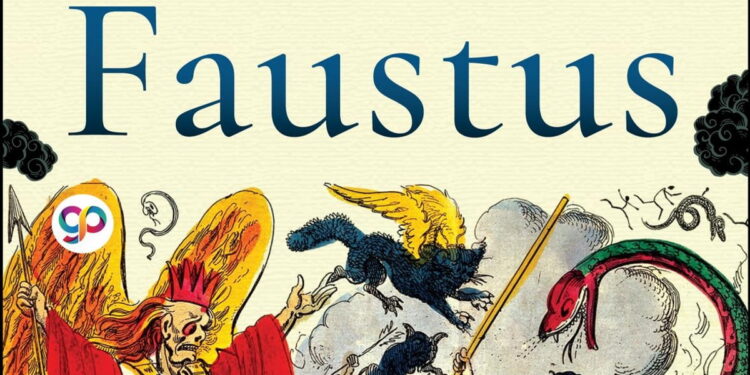Discuss the theme of sin and redemption in the play Dr. Faustus
The classic tragedy Doctor Faustus by Christopher Marlowe examines the nuanced relationship between sin and atonement. The play, which explores the effects of one man’s unrelenting quest of power, knowledge, and pleasure, was written in the late 16th century. Marlowe uses Dr. Faustus, the main character, as a means of exploring the insatiable human need for more in contrast to the negative effects of giving in to wicked temptations.
Faustus’ Ambition and the Pact with Mephistopheles:
The insatiable ambition of Dr. Faustus lies at the center of the play. The brilliant scholar Faustus chooses to use the forbidden practice of necromancy in order to acquire unbounded power because he is dissatisfied with conventional knowledge. In his quest for occult knowledge, Faustus makes a deal with Mephistopheles, the devil. This covenant, sealed with his own blood, signifies the start of Faustus’s fall from grace.

The agreement itself represents the Faustian bargain, a literary device in which a character trades their soul for material wealth. Because of his insatiable desire for power and knowledge, Faustus voluntarily gives his soul to the devil. The ultimate sin, this act of signing away one’s soul, is what causes Faustus’s impending demise.
The Seven Deadly Sins and Temptation:
Pride, greed, wrath, envy, lust, gluttony, and sloth are the seven deadly sins that the play vividly depicts as Faustus forms his unholy alliance with Mephistopheles. Faustus is tempted by every sin, which eventually causes him to stray from the straight and narrow.
Pride is particularly evident as Faustus revels in his newfound magical abilities. His arrogance blinds him to the consequences of his actions, and he dismisses the warnings of the Good Angel and the Old Man. The relentless pursuit of knowledge transforms into a dangerous vanity that distances Faustus from redemption.
The Struggle for Redemption:
Amidst the growing darkness, Marlowe introduces elements of redemption. The Good Angel and the Old Man serve as symbolic figures representing Faustus’ internal struggle between good and evil. The Good Angel urges him to repent and seek redemption, while the Old Man encourages virtuous living. Faustus, however, succumbs to the alluring whispers of Mephistopheles and the personification of the Seven Deadly Sins.
Also Read-
- What is form in a sonnet
- The characters about of Alison and Jankins
- Discuss the style and themes of the poems of Kamala Das with special reference to the poems
The concept of redemption is also embodied in Faustus’ interactions with religion. He grapples with the fear of damnation, and as his inevitable damnation draws near, he experiences moments of remorse. These fleeting moments of guilt and self-awareness hint at the possibility of redemption, yet Faustus remains ensnared by his desires.
The Clock Ticking Towards Damnation:
A prominent motif in “Doctor Faustus” is the ticking clock, emphasizing the limited time Faustus has to repent. As the clock counts down, the tension between sin and redemption heightens. Faustus’ internal turmoil intensifies, and the play becomes a poignant exploration of the consequences of choices and the potential for redemption even in the face of imminent damnation.
The Final Tragedy:
In the climactic scenes, Faustus’ fate unfolds tragically. Despite moments of hesitation and internal conflict, he ultimately fails to seize the opportunity for redemption. The demonic forces claim his soul, and he is dragged into hell. Marlowe’s portrayal of Faustus’ tragic end serves as a stark reminder of the consequences of succumbing to sin and the elusive nature of redemption once the pact with the devil is sealed.
The Ambiguous Ending:
Regarding Faustus’s ultimate fate, the conclusion of “Doctor Faustus” leaves room for interpretation. According to certain interpretations, Faustus’ damnation is irreversible, emphasizing the play’s somber depiction of the results of unbridled sin. Some contend that the ambiguity offers a ray of hope, implying that there is still hope even when faced with unchangeable decisions.
Relevance of the Theme in Modern Contexts:
The theme of sin and redemption in “Doctor Faustus” remains relevant in contemporary society. The play serves as a cautionary tale, prompting reflection on the consequences of unchecked ambition, the allure of sinful temptations, and the potential for redemption even in the darkest moments.
Conclusion:
The tragic story “Doctor Faustus” by Christopher Marlowe explores the consequences of unbridled ambition and the seduction of immoral temptations. It is a powerful examination of the theme of sin and redemption. Driven by an unquenchable desire for power and knowledge, Dr. Faustus makes a terrible agreement with the devil, initiating a sequence of events that will ultimately result in his terrible damnation. The conflict between good and evil is depicted in vivid detail in the play as Faustus struggles with regrets and the clock counts down to his unavoidable demise. The film’s ambiguous conclusion begs readers and viewers to consider whether redemption is still possible even in the face of irrevocable decisions, raising the age-old question of whether humans are capable of salvation.
FAQ:
1. What is the Faustian bargain in “Doctor Faustus”?
The Faustian bargain refers to Dr. Faustus’ pact with the devil, Mephistopheles. In exchange for his soul, Faustus gains magical powers and worldly knowledge, symbolizing the theme of trading spiritual well-being for temporal gains.
2. How does the play portray the Seven Deadly Sins?
Each of the Seven Deadly Sins is personified in the play, tempting Faustus away from virtue. Pride, greed, wrath, envy, lust, gluttony, and sloth play a significant role in Faustus’ descent into sin, emphasizing the consequences of yielding to these temptations.
3. Is there a possibility of redemption for Faustus in the play?
The play explores the theme of redemption through Faustus’ internal struggle. Despite moments of remorse and the presence of figures like the Good Angel and the Old Man representing redemption, Faustus ultimately fails to seize the opportunity for salvation, leading to his tragic damnation.
4. What is the significance of the ticking clock in “Doctor Faustus”?
The ticking clock is a motif symbolizing the limited time Faustus has to repent and seek redemption. As the clock counts down, the tension between sin and redemption intensifies, highlighting the urgency of Faustus’ internal conflict.
5. How does the play’s ambiguous ending contribute to the theme?
The ambiguous ending allows for multiple interpretations regarding Faustus’ ultimate destiny. Some view his damnation as inevitable, emphasizing the consequences of unchecked sin. Others see the ambiguity as an invitation to contemplate the possibility of redemption, even in the face of irreversible choices, adding complexity to the overarching theme of sin and redemption.
6. Why is “Doctor Faustus” still relevant today?
The themes explored in “Doctor Faustus,” such as unchecked ambition, the consequences of sin, and the potential for redemption, remain relevant in contemporary society. The play serves as a cautionary tale, prompting reflection on the human condition and the choices individuals make in their pursuit of knowledge, power, and fulfillment.













